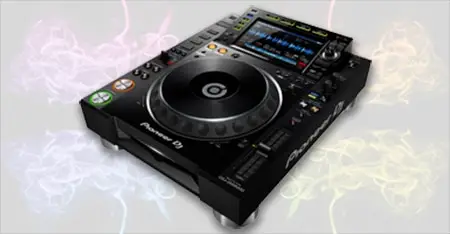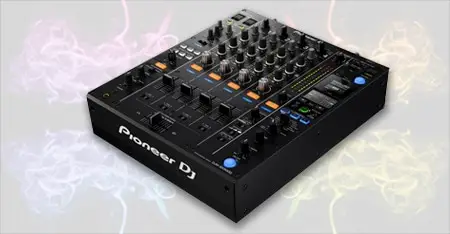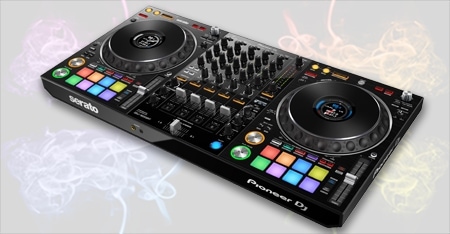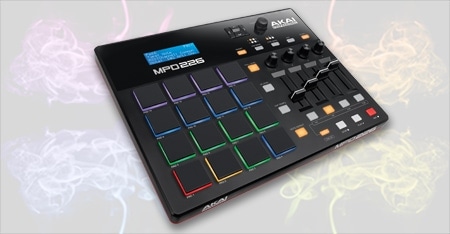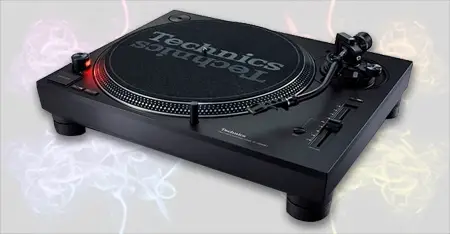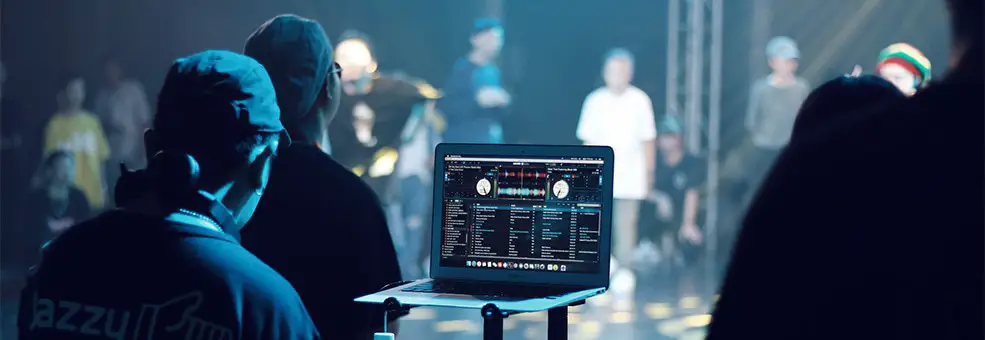
“Mobile DJ” can mean many different things and serve many different functions. The most simple answer to what is a mobile DJ is… Someone that travels to different venues, playing music for specific events arranged by a client. But of course, it goes way beyond that…
A mobile DJ is someone that brings their own equipment to a venue and play to a brief that’s been set out by the client that hired them. The type of venue a mobile DJ will play varies greatly and depends on the type of event being thrown. A wedding disco in a marque, instead of indoors, for example.
That is a fairly simplistic explanation and there is much more that goes into the job of a mobile DJ so it worth reading about in greater detail.
What Is a Mobile DJ?
Contents
The most famous type of mobile DJ is the wedding DJ.
And we all know these. They tend to be seen as a bit cheesy and playing cheesy music designed specifically to get everyone up and dancing.
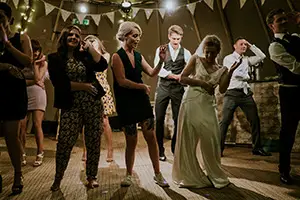
The mobile wedding DJ might also get on the mic to hype the crowd, invite people to dance or make announcements.
However, mobile DJs don’t have to be as cheesy as you imagine wedding DJs to be.
Increasingly it is becoming more and more common for brands to hire mobile DJs. This helps them appear more edgy, modern and create atmosphere by playing good music.
This is why you often now find DJs performing in retail stores of a weekend or special events like product launches.
It doesn’t always work of course…
I once saw a DJ performing in the front window of a famous High Street store and they just looked incredibly uncomfortable. It was out of context and no one could really make out why the DJ was there.
However, when it does fit in with the retailer’s image (like the hip hop inspired Culture Kings for example), then it makes a bit more sense for a DJ to be performing there.
What is a Mobile DJ? Someone Who Sticks to a Brief
Another key point when answering what is a mobile DJ is that they tend to follow a specific brief from their client.
This can be in terms of the type of:
- The music style that they have to play
- The energy level that they have to maintain
- Whether they are there to get people dancing, or just provide background music
The mobile DJ may also have a specific timeline to follow to keep the event on track.
Sometimes they are also told which genre to play or to avoid, although this would often be done by the booker beforehand. For example, they are not going to book a Techno DJ to do a cheese set.
Certain types of mobile DJ, like wedding DJs, also have to be prepared to take requests. Although of course, not all will do so.
What Is a mobile DJ’s setup?
While a lot of venues will have a sound system, or DJ equipment, not all do. One of the benefits of hiring a mobile DJ is that they often bring their own, entire set up with them.
This will vary depending on the size of the venue and the equipment needed of course.
A typical setup will include:
- a laptop to run DJ software
- a DJ controller that controls the software
- an amp
- PA/speaker system, that usually comprises
- two or more speakers
- and maybe some subwoofers
These last two depend on the type of music and the size of the venue. Larger venues require more speakers of course.
To see our recommended gear, head to this page.
While subwoofers are for bass-heavy music. So you might not need them if you’re just playing some light background for example.
Being a Mobile DJ
Things have changed massively for mobile DJs, some things used to be a lot harder and others much easier.
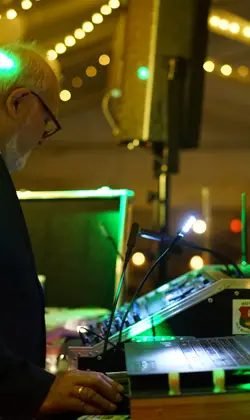
Back in the days of vinyl decks (see our recommended vinyl decks here) you needed to carry large vinyl collections with you. This meant a lot of effort went into being a mobile DJ.
You would have to carry and set up, large amounts of equipment everywhere you went.
Also, to make sure that you were able to play any requests you would have to take hundreds of vinyls with you. Which of course are extremely heavy and difficult to carry.
Things were easier back then as not many people had the equipment or the vinyl collection to do events properly. As there was less competition from other mobile DJs then it used to be a fairly steady and well-paid job.
Especially when you consider the wide variety of events that a mobile DJ can play.
Weddings being the most obvious but they are also booked for:
- Engagements
- Proms
- Graduations
- Birthdays
- Anniversaries
- Engagements
- Fashion shows
- Product launch parties
- Bar Mitzvahs
- And many others
However, things have changed dramatically in recent times.
Now, with laptops, USB sticks, and DJ controllers it is easy to carry thousands of tracks as well as the equipment itself. Its never been simpler for a DJ to just show up and plug in their equipment. Which, mostly, can be transported fairly easily in a standard car, except for moving a speaker system perhaps.
What has got more difficult these days is the amount of competition that mobile DJs face. This is because anyone with a laptop, and a little know-how about audio equipment, can download music and start DJing.
As a result, mobile DJ work has become much more competitive.
Love DJ gear?
So do we, check out our favorites…
Where Did Mobile DJing All Start?
Mobile DJs, as we know them today, can be traced back to the mid-60s when a guy called Roger Squire set up the first official mobile DJ business. Before this, the question of what is a mobile DJ didn’t even exist!
Being the first, he very quickly established a good reputation and ended up playing events for celebrities and royalty. This meant that pretty soon he was employing other people and doing up to 60 functions a week.
His success quickly spawned copycats and, ever since it has grown into the booming industry we see today.
What Is the Role of the Mobile DJ?
The answer to what is a mobile DJ in terms of role has evolved over the years. Previously they may have literally just shown up to set up the equipment and play the music.
Whereas now they can be more involved in the organization of the event itself. A lot of mobile DJs also promote themselves as event organizers.
This means they may influence on everything from the decorations, to the running order and perhaps also things like catering. Although they would tend to outsource things like that to another company. They then manage everything as well as then doing the music on the night.
This has allowed mobile DJs to increase their fees from the 1970s average of $400 per event to around $1,000 (according to this 2014 survey TK).
What Is a Mobile DJ’s Hours?
While a mobile DJ does control their own hours and is often self-employed, they will often be working unsociable hours.
Although they do exist, daytime gigs (like in retail stores) are minimal and much less common than the nighttime gigs. This does allow mobile DJs to have a second job outside of their DJing, which many do.
The downside being, for the most part, mobile DJs always work evenings and, almost certainly, every Friday and Saturday night. Assuming they are successfully getting bookings of course. This means, if you do have a second job, then a lot of what would be your downtime i.e the weekends, will be taken up being a mobile DJ.
However, when you establish yourself a good reputation then being a mobile DJ can bring in an excellent second income.
Which Is Harder, Mobile DJing or Club DJing?
This is a debate people love to wage in the DJ world. And the opinions are varied but (mostly) all valid. A general consensus tends to be that mobile DJing harder for a couple of reasons.
- You have to carry and set up and move all of your equipment
- Aside from physical labor, there is the added stress of being the one to make sure that everything works
- You also have to be a lot more sociable. You are there to do a very specific hired job so have to be polite and take requests & fulfill those requests as required
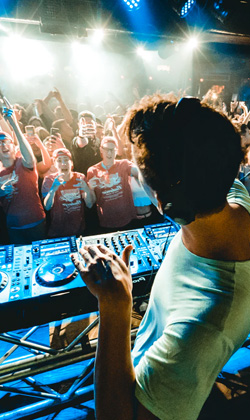
Club gigs, however, are generally seen as more fun by DJs as they can:
- Play the exact type of music that they like
- They have a lot more freedom i.e generally no rules outside of set times
- They don’t have to take requests
- While they should still always be polite and sociable this is much less of a requirement
Updating your is perhaps harder in that you need to put a lot more effort into keeping up with music. Especially if you are playing specialist, genre-specific events.
For example, if you play a Techno event with tracks that are months or years old, then everyone will know you are behind the times.
Of course, which type of DJing people find easier/more difficult also depends on the type of person. Those that enjoy cheesy/commercial music, are great at chatting to all age groups and putting a smile on their faces will be very happy doing mobile DJ gigs.
Which Pays Better Mobile DJing or Club DJ?
Of course for the superstar DJs, then the answer is going to be Club gigs. However, for the majority of semi-pro DJs, chances are that mobile DJing is going to pay better.
A lot of smaller clubs aren’t willing to pay more than one or two hundred dollars for a relatively unknown DJ. And tbh, that’s if they want to pay them at all…
However for Mobile DJs like for a wedding or prom then the client isn’t really looking for a known DJ. Yet they are willing to pay several hundred or even a couple of thousand dollars depending on the length of the event.
What Makes a Mobile DJ Good (or Not)
One of the key points that any DJ must do, both club or mobile, is to make the audience have a good time.
The best way a DJ can enthuse and encourage them to enjoy themselves is to actually have fun themselves.
So a good mobile DJ should always:
- Be prepared
- Actually enjoy the music that they are playing
- Enjoy meeting new people
- Be happy to socialize (people love to speak to the DJ)
- Follow any brief or guidelines laid out by the client
- When they are there doing the job, should have fun and let it show
When a DJ follows these points, and the crowd can tell that they are having fun, they are much more likely to get involved, dance and create a successful event.
What you don’t want is a mobile DJ that shows up and just very obviously just wants to get through the night. The worst is when they sit down, hiding behind the decks (see our recommended decks here) and just press play on the tracks. All while looking miserable.
When a DJs energy is flat, then it’s safe to assume that the audience will pick up on that.
This is why a lot of good DJs pick up work through referrals. As anyone who’s enjoyed the DJ at their event is more than happy to recommend them to someone holding something similar.
The Difference Between Club DJs and Mobile DJs
One of the key technical differences between the two types of DJs is how they keep the crowd dancing. A club DJ will typically create a seamless mix of nonstop music, made up of a similar genre.

They do this by “beat matching” i.e syncing the tempo of the tracks they are playing so that they can blend seamlessly and in time, from one to the other.
This creates a steady and constant flow to the evening and keeps a dancefloor busy.
A mobile DJ tends to play more of a variety of music and genres and is far less likely to beat match.
This is because, when you play to a mixed crowd (like at a wedding) then the emphasis lies on keeping as many people happy as possible.
Given that there’ll be a vast age range, generally, then the mobile DJ will play a mix of genres as well as fast and slow songs. Therefore, the tune selection and the ability to please people become far more important than playing a specific genre and mixing tracks as smoothly as possible.
The equipment that a mobile DJ and club DJ uses also varies. Club DJs tend to use separate decks and a mixer. While mobile DJs will tend to use all in one controllers due to their portability.
Where Is Mobile DJing Going?
With technology and generations, moving forward and DJing becoming easier, then there is evermore crossover between the club and mobile DJ.
Not least because dance music itself is becoming more and more commercial. Because of this, it is more and more common for club DJs to do mobile DJ gigs on the side. As a result, you are seeing more of the “true” DJ experience at a typically mobile DJ event. This is something that the upcoming generations, in particular, are requesting more.
Conclusion – What Is a Mobile DJ?
They are someone who ensures your crowd have a good night and enjoy themselves in whatever manner you choose.
I.e when YOU are the client then a mobile DJ is whatever you want them to be.
FAQs: What Is a Mobile DJ?
What is a mobile DJ business?
A mobile DJ business is really any person who offers a service that includes bringing the equipment necessary to play music, as well as providing a person / DJ to actually perform on the night. Often to a brief given by a client.
A good example of this would be weddings. In this case, the bride and groom will have chosen a DJ that plays the type of music they want to hear on the evening. Then the DJ will be able to bring everything needed from the sound system through to the DJ decks (see our recommended decks here) and a vast library of tracks to play. Then, on the day, the DJ will have the technical skills to play and mix those tracks together, depending on the mood of the crowd and any order of events they need to stick to.
A mobile DJ business will also be able to tailor the service they offer to the type of event they are playing. These vary massively and include everything from playing at weddings or birthday parties through to playing corporate events. These could be a company that is launching a new product for example or even things like fashion shows or after-parties.
So a mobile DJ business needs to have DJing kit available as well as the skills to be flexible enough to tailor their service to the event they have been booked for.
What next?
- Starting to DJ and need to choose a name? Check out our in-depth guide.
- Going to be DJing weddings? Make sure to get it right using this guide.

